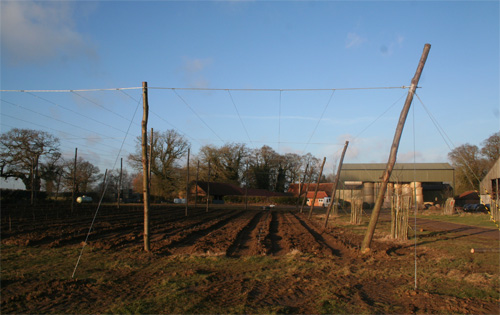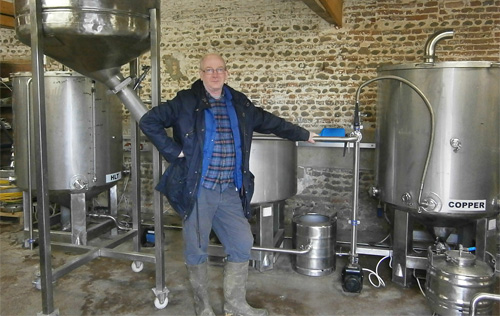A hop garden has been planted at Salle Moor Farm near Reepham to supply raw material for the All Day Brewing Company, which moved into one of the farm’s business units last year.

The hop garden at Salle Moor Farm after the traditional wirework trellis system was constructed in January
Brewery director Dr Simon Barker said: “The hop garden is about a quarter of an acre in size, and hopefully, when established, will keep me going for my main hops. I’m sure it’s going to be the only traditional hop yard in Norfolk, and it is, of course, attached to the brewery.”
Hops are vigorous, climbing plants that grow tall, so they have to be grown up strings, supported by wires, which are in turn supported by tall poles.
After preparing the ground, a traditional wirework trellis system was constructed over four days at the end of January by Mervyn Carless of Herefordshire, who is probably the last remaining builder of hop gardens in the UK, having followed in his father’s footsteps.
The poles are about 6 metres tall and made from coppiced chestnut brought from Essex last year.
After the trellising was erected, around 400 hop plants were planted in mid-February, mainly traditional British varieties, such as Fuggles and Goldings. These will be trained to grow up strings in the hop garden.
Interestingly, most of the UK’s hops are raised in Suffolk, just outside Ipswich, before being despatched for growing in the main hop producing areas of Kent and Hereford/Worcestershire.
“I’m not sure why no-one else is growing hops commercially in Norfolk,” said Dr Barker. “There were hop gardens in the county up until the early part of the 20th century and there’s no reason why they shouldn’t grow here again, as they are often found wild in hedgerows.”
The herbaceous perennial plants should produce hops for the next 10-15 years, although maximum production is not expected until 2016, explained Dr Barker, who until 2013 had worked as a full-time psychiatrist in Norfolk for around 30 years, as well being an avid home brewer.
Around 500 pounds of dry hops, which are used primarily as a flavouring and stability agent in beer, are expected to be harvested each year from the Salle hop garden. With each brew of 144 gallons requiring 3-5 pounds of hops, there should be enough for two brews (or 2,300 pints of beer) a week, he estimates.
Dr Barker is currently producing two beers, Summer Haze, a raspberry wheat beer, and Salle Ale, a traditional English bitter, and is developing other ales, such as IPAs and dark beers.
The inspiration is the notion of “terroir” much loved by French winemakers, which reflects a sense of place and takes into account the local soil and climate. As well as home-grown hops and water drawn from a borehole, the Salle brewery is already using some of the barley grown on the farm and aims to use yeast from the National Collection of Yeast Cultures in Norwich.
Dr Barker is also growing herbs, such as ginger and coriander, in poly-tunnels at the farm which he plans to use in his beers. He even intends to try malting his own barley and has begun making cider from the fruit of an old apple orchard at Salle Moor Farm, the first samples of which were sold at Reepham’s Festival of Light in December.
The All Day Brewing Company only sells its products to the local trade at present, but plans to apply for an off-licence to sell beer and cider on-site.

Dr Simon Barker, director, All Day Brewing Company, Salle Moor Farm
